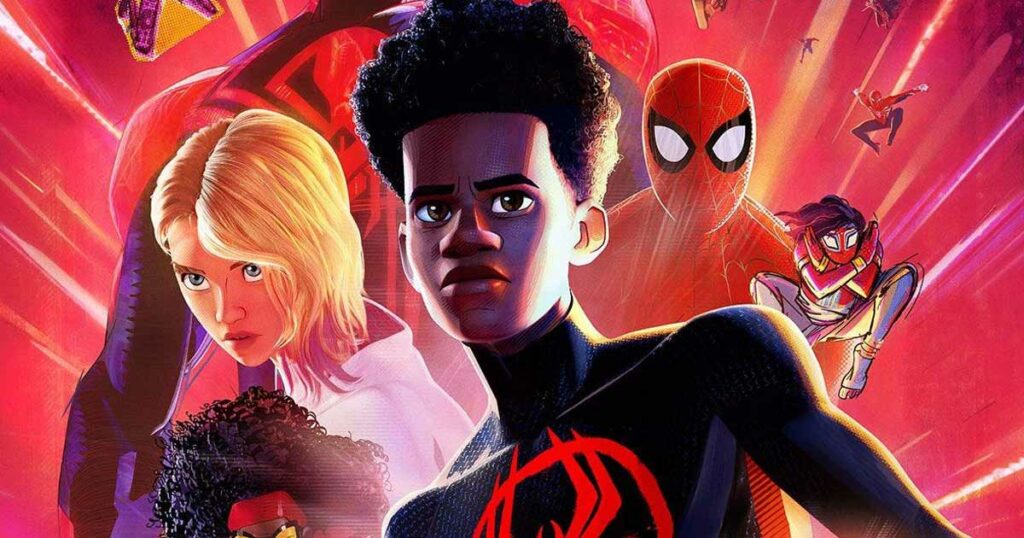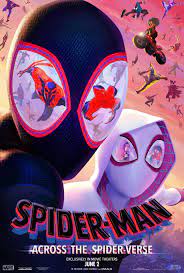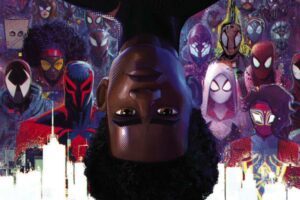Directed by Joaquim Dos Santos, Kemp Powers, and Justin K. Thompson | Written by Phil Lord, Christopher Miller, Dave Callaham | 140 min | ▲▲▲△△
When I saw the first entry in this animated Spider-Man franchise, I was certainly in the minority for not gushing wildly over it. It’s good, but the various plot issues — some of which actually get solved in this sequel — were a drag, as was the frenetic animation style that hurt my eyes and my brain.
I think now, a few years later, I should probably just acknowledge that this is a superhero movie where I’m not the key demographic, which feels weird for having read Marvel and DC comics since I was six. But I can appreciate the tempo at which these movies tell their tale is set for those who’ve been raised to receive information at a velocity higher than I’m accustomed.
This new edition comes at you with similar haste. It doubles-down on the nature of the multiverse, a web that was spun in the previous film (and elaborated on in movies like this one and this one since). The story goes in a wonderfully serious sci-fi direction that makes it feel as much a dystopian noir as it does a superhero film. The picture is also so playfully meta it will reward longtime Spider-fans as well as internet and pop-culture connoisseurs. But this newest Miles Morales spider-movie also comes with new problems that occasionally undermine the fun it delivers.
The bones of the plot will be familiar to anyone who saw the first one — Miles Morales (the voice of Shameik Moore) is a Brooklyn teen who goes to a high school for the gifted and now dreams of going to Princeton for physics. He’s still mooning over Gwen Stacey (Hailee Steinfeld), a Spider-Person from another universe where her life is similar to Miles’, including having a police-officer father (Shea Whigham). The opening is a blast — Miles has to meet his parents (Luna Lauren Velez and Brian Tyree Henry) and a school counsellor but is delayed due to a tangle with a baddie named The Spot (Jason Schwartzman), who takes it badly when Spidey calls him a Villain Of The Week. It turns out he’s a product of the selfsame dimensional doohickey the Kingpin was messing with in the last movie, and blames Spider-Man for his burdensome new abilities.
Faster than Spidey can spin a web, he and Gwen are skipping between dimensions, crossing paths with other Spider-People (voiced by an impressive list of talents, including Oscar Isaac, Issa Rae, Andy Samberg, Jack Quaid, Amandla Stenberg, and Daniel Kaluuya) and a couple well-placed cameos from familiar faces. It turns out Miles is something of an outlier among the Spider-People and his destiny isn’t necessarily written the way his inter-dimensional counterparts have been.
And that’s the heart of the thing, the plot orbiting a philosophical question around the fate you make for yourself versus inevitable tragedy, the question of whether you can change it even in the face of a multiverse of brothers and sisters who say you can’t. The caffeinated pace also allows for plenty of humour, both in the verbiage and visual gags — even as the film leans into these questions of maturity, character, and identity, it also makes fun of the mythos, all the possible variety of these stories that exist on the comic page, TV, and the movies. Much of this is very silly, but the movie knows it — the Spider-Punk is totally ridiculous, for example — but the design of his character, and his world, is a delight.
Which brings us to the look of the thing: With the exception of some of those frenetic action sequences, I loved the visuals of Spider-Man: Across The Spider Verse. The impressionist shades — you see it in the backgrounds of Gwen’s apartment — bring a hypnotic sheen to the entire production, along with all those other visual styles representing all those parallel universes. At times you wish the movie would just slow down long enough so we could appreciate the gorgeous artwork on display. The score by Daniel Pemberton is a huge improvement over the music mix in the last film — this one runs on a synthesized pulsing and orchestral swell that evokes the best of Vangelis and Wendy Carlos.
So, with all that’s right, where does it go wrong? Well, in its effort to be a speedy, thoughtful, funny, science-fictional coming of age superhero movie, it simply can’t do all of that and be entirely coherent or moving. At times it’s awkwardly episodic — you can feel the filmmakers wishing they were telling this story as a series on a streaming service — and way too long: Despite it being a two hour and 20-minute movie, it has the temerity to end on a cliffhanger (Spider-Man: Beyond The Spider Verse is due in 2024), which is pretty obnoxious. Groans in the audience I saw it with were audible as the credits rolled.
Miles Morales has many of the compelling fundamental character elements that Peter Parker does, but this time out he’s not trying to date his classmate while learning first hand about self-sacrifice, he’s travelling across dimensions hoping this cadre of fellow Spider-heroes accept him as one of their own. It’s epic, it’s a feast for the eyes, and frequently fun, but it’s also feels detached from what made Spider-Man so compelling to start with.
And what always worked so well with Spider-Man is his loneliness, that the very powers that make him so special, and so joyful, make his regular life a misery. As both this and the last film established, he’s not alone at all, and that sense of community feels counter to some core aspects of his identity.
But, as we’ve already established, Miles Morales isn’t Peter Parker. While I appreciate a lot of what this particular superhero franchise has to offer, parts of it just don’t work. And the reason I feel that way is probably because it’s not made for me.
















